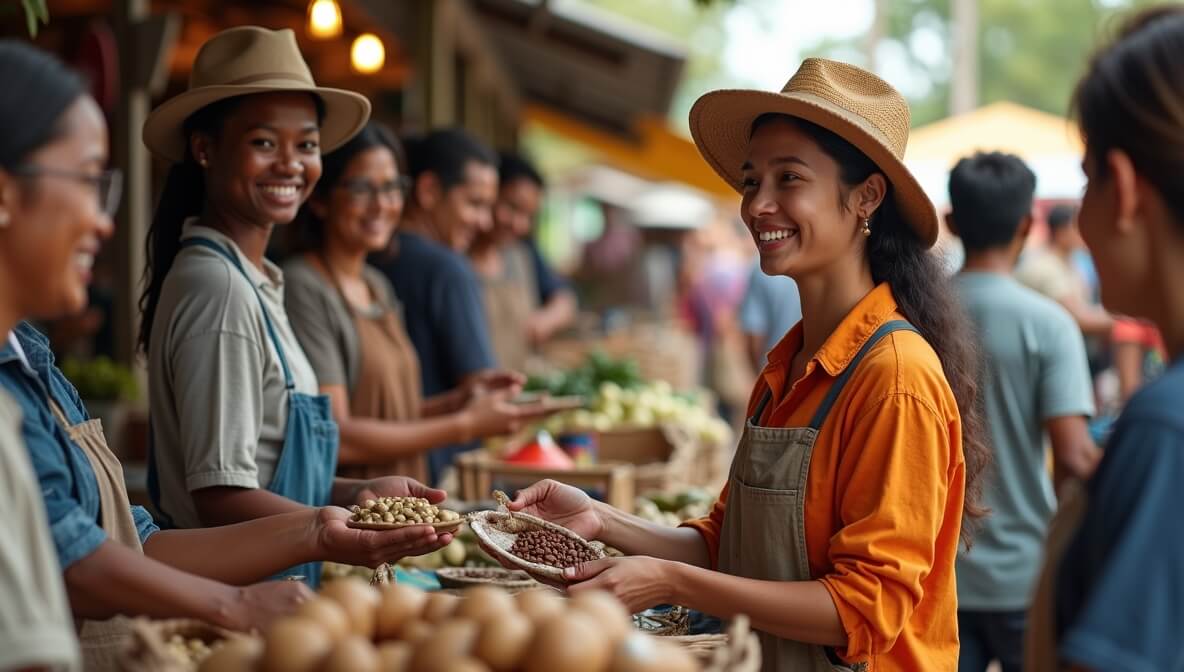Understanding Fair Trade Practices and Why They Matter

Every time we buy coffee, chocolate, or clothing, we make a choice that echoes far beyond the checkout line. Behind every product lies a person — a farmer, a weaver, a cocoa picker — whose life is directly shaped by the ethics of global trade.
Fair Trade is a movement and certification system designed to transform this chain of consumption into a more just, equitable, and sustainable one.
What is Fair Trade?
Fair Trade is both a philosophy and a verified system that prioritizes people and the planet over profit. At its core, it ensures that producers in developing nations receive:
- Fair Wages — including a guaranteed minimum price and a premium for community investment.
- Safe Working Conditions — no child labor, no exploitation, and protection under international labor laws.
- Environmental Stewardship — through support for organic, regenerative, and sustainable farming practices.
- Empowerment — especially of women, smallholder farmers, and Indigenous communities.
According to Fairtrade International, over 1.9 million workers and farmers are part of certified Fair Trade systems across more than 70 countries.
This system isn’t just about better prices — it’s about transforming global supply chains into engines of dignity and sustainability.
Why Fair Trade Matters
1. Protects Small Farmers from Market Volatility
- Commodity prices for goods like coffee, cotton, and cocoa can crash unexpectedly. Fair Trade sets a minimum price floor, shielding small producers from economic ruin during downturns.
2. Promotes Eco-Friendly Practices
- By limiting pesticides, encouraging biodiversity, and rewarding organic certification, Fair Trade helps reduce environmental harm and supports climate-resilient agriculture. This intersects closely with global efforts to tackle plastic pollution and environmental degradation — as explored in this piece on climate action.
3. Builds Stronger Communities
- Every Fair Trade product includes a community development premium. These funds are invested into projects like:
- Clean drinking water
- Women’s empowerment programs
- School supplies and education
- Local health care clinics
4. Empowers Ethical Consumerism
- In an era of fast fashion and cheap imports, Fair Trade invites us to pause and align purchases with our values — supporting dignity, transparency, and climate responsibility.
Fair Trade in Action: Coffee, Chocolate & Clothing
Coffee
- The most traded commodity after oil, coffee often involves exploitative wages and poor labor conditions. Fair Trade coffee:
- Guarantees farmers a fair price
- Encourages agroforestry
- Supports women-led co-ops in Latin America and Africa
Chocolate (Cocoa)
- The chocolate industry has long been criticized for child labor and unsustainable farming. Fair Trade cocoa:
- Prohibits child exploitation
- Provides training for regenerative agriculture
- Gives farmers long-term contracts and price stability
Fashion (Cotton & Textiles)
- Fair Trade-certified fashion fights the dark side of fast fashion — poor wages, pollution, and modern slavery. It encourages:
- Living wages across supply chains
- Organic cotton farming
- Slow, ethical manufacturing
- For broader insight into ethical models in the creative world, music platforms article highlights platforms that champion fair compensation for creators, mirroring Fair Trade’s values in digital content.
How You Can Support Fair Trade
Even small shifts in your shopping habits can create global impact. Here’s how to start:
- Look for Labels
- Trusted certifications include:
- Fairtrade Certified
- Fair Trade Certified™ (by Fair Trade USA)
- Rainforest Alliance
- WFTO (World Fair Trade Organization)
- Buy Local + Fair
- Combine local sourcing with ethically imported ingredients (e.g., buying chocolate from a local bakery that uses Fair Trade cocoa).
- Support Verified Brands
- Check out directories like Fair Trade Federation to discover brands that meet full Fair Trade standards.
- Ask Brands Directly
- Send an email or social media message: “Are your products Fair Trade certified?” Ethical brands will happily answer.
- Educate Others
- Share your knowledge with friends, family, and your social media audience. Education spreads change.
Challenges & Criticisms
No movement is perfect. Some criticisms Fair Trade faces include:
- Certification Costs – Some small farmers can’t afford them, even if their practices align with Fair Trade principles.
- Limited Consumer Awareness – Despite its growth, many shoppers don’t understand or prioritize Fair Trade.
- Scalability – Global supply chains remain dominated by large corporations, making widespread adoption slow.
Still, the alternative — a world of unchecked exploitation and climate collapse — makes Fair Trade a crucial counterbalance. As awareness grows, so does the market for ethical goods.
Fair Trade and Broader Justice Movements
Fair Trade aligns with many modern movements, including:
- Food Security – Ethical trade supports stable incomes and better nutrition (see How Food Banks Make a Difference).
- Youth Empowerment – Involving youth in ethical leadership and decision-making fosters global citizenship (Mentorship Matters).
- Mental Health & Human Dignity – Fair treatment at work affects mental health outcomes, stress, and life satisfaction. Learn more in mental health guide.
Final Thoughts
“Every time you spend money, you’re casting a vote for the kind of world you want.”
– Anna Lappé, author and sustainability advocate
Fair Trade isn’t charity — it’s justice. It’s about giving farmers and workers the power to thrive, not just survive. It’s about making sure your coffee doesn’t come at someone else’s expense. And it’s about redefining the rules of global commerce so dignity, sustainability, and fairness come first.
Your next cup of coffee, bar of chocolate, or cotton T-shirt could be a step toward a better world.
Additional Resources
